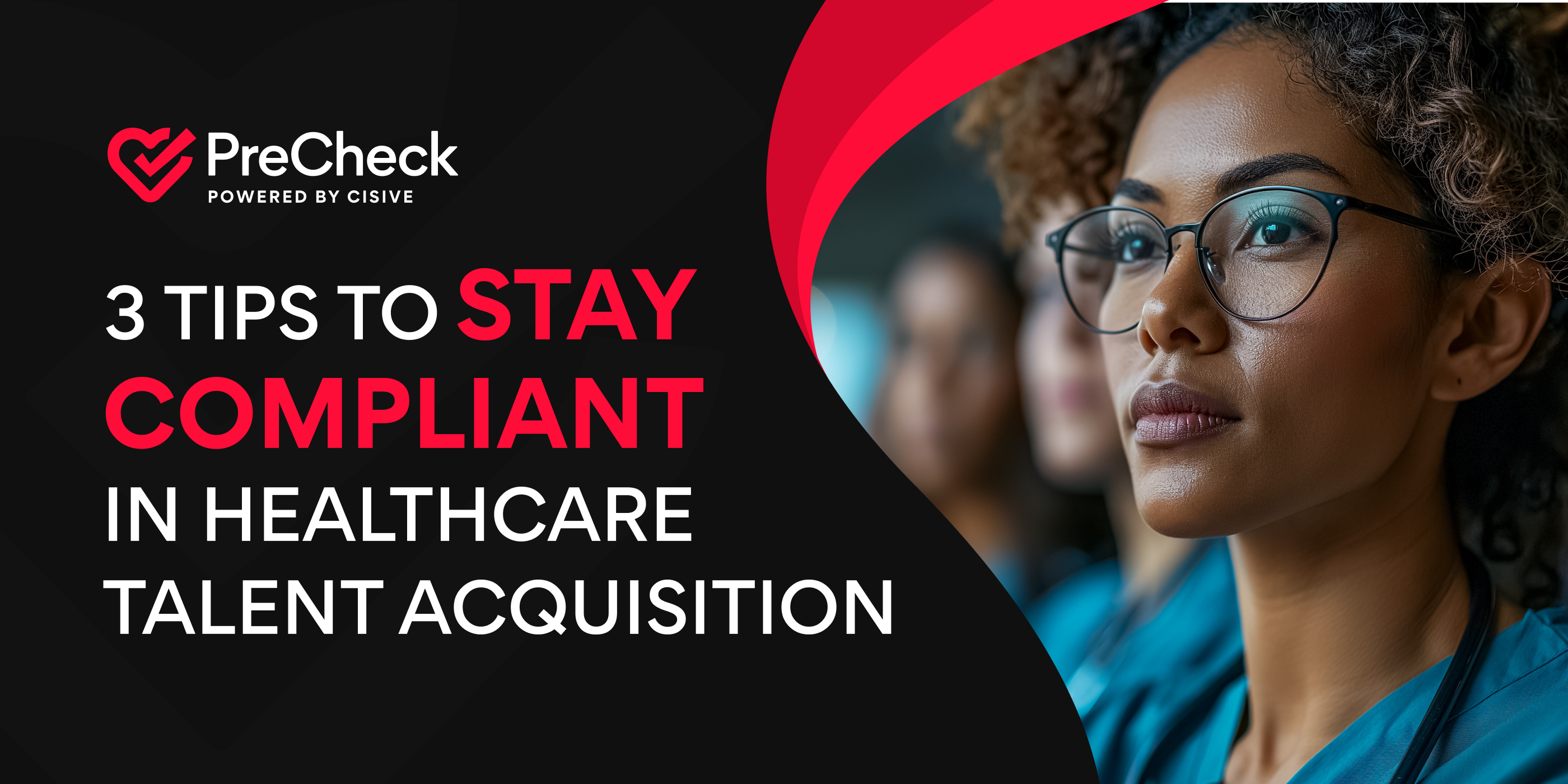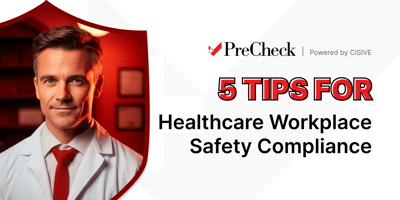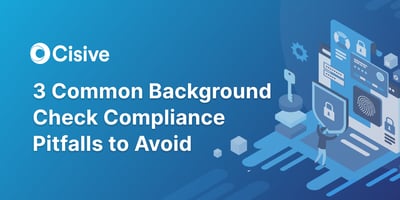

The Occupational Safety and Health Administration (OSHA) governs workplace safety conditions for...

Healthcare is one of the most heavily regulated industries in the world, so you need to be aware of relevant laws and regulations. If you don't comply, your organization could be fined, sanctioned by a government agency, or face other penalties.
Learn more about regulatory compliance in healthcare and find out how to overcome some of the most common compliance challenges.
Key TakeawaysHere's what you need to know about talent acquisition and regulatory compliance in healthcare:
|
Talent acquisition and regulatory compliance in healthcare go hand in hand. Talent acquisition is a set of strategies and processes used to attract, hire, and retain human capital.
Regulatory compliance is the process of complying with the rules governing healthcare organizations. These rules take the form of policies, procedures, laws, regulations, and standards.
Some regulations apply to the strategies and processes used to acquire talent. Therefore, you need to understand each regulation and know how to apply it to your sourcing, recruiting, and onboarding activities.
Talent acquisition compliance combines the principles of talent acquisition and regulatory compliance into one, ensuring you find high-quality employees without violating any relevant laws or regulations.
For example, many organizations must conduct background checks to comply with the regulations developed by government-funded healthcare programs. This makes talent acquisition compliance especially difficult for employers in the healthcare industry.
PreCheck takes the guesswork out of talent acquisition compliance, giving your HR team more time for strategic planning and other activities.
Recommended Reading: Best Healthcare Background Check Services 2024
The strategies and processes you use for talent acquisition have a direct impact on your organization's ability to comply with industry rules. At the most basic level, talent acquisition compliance requires you to embed compliance activities into every stage of the sourcing, recruiting, and onboarding processes.
For example, many states require hospitals and other healthcare organizations to conduct criminal background checks on potential hires who will have direct contact with patients.

Before you can comply with healthcare regulations, you must know what they are. Here are some of the most common industry regulations and the potential penalties for noncompliance.

Maintaining a strong connection between talent acquisition and regulatory compliance has several benefits for healthcare organizations. Here are a few examples of how your talent-acquisition strategy can affect healthcare regulatory compliance.
With the right talent-acquisition strategy, it's possible to attract, hire, and retain highly qualified employees. When staff members have the right knowledge and skills, they provide better care, improving patient satisfaction.
Experienced, knowledgeable employees also understand the importance of following relevant regulations. Therefore, an emphasis on talent acquisition also helps you protect patient privacy.
Recommended Reading: How to Automate Your Healthcare Employment Verifications
As noted previously, a single violation may result in a fine of $10,000 or more. If your organization has multiple violations, the financial penalties may exceed $100,000.
A good talent acquisition strategy helps you identify potential hires who understand the rules and know how to comply with them, which may help you avoid hefty fines.
Hiring the right people may also help your organization preserve its positive reputation in the community.
Many industry regulations have a direct impact on patient satisfaction and outcomes. For example, patients don't take too kindly to the unauthorized disclosure of their protected health information.
Taking a strategic approach to talent acquisition increases patient satisfaction by helping you avoid these negative outcomes.
Additionally, high-quality employees tend to provide better patient care, which may lead to lower rates of sepsis, hospital-acquired infections, and other health issues. As a result, changing your approach to talent acquisition may lead to better patient outcomes.

Healthcare organizations face several challenges as they attempt to maintain a strong connection between regulatory compliance and talent-acquisition activities.
Nurses and doctors aren't the only healthcare professionals who deal with sensitive patient data. Registration clerks, medical coders, billing supervisors, and other staff members have access to patient names, addresses, medical record numbers, Social Security numbers, and other sensitive information.
If staff members aren't aware of the rules, or if they don't have the resources to comply with them, your organization may face stiff penalties.
Now that many organizations use digital records, data security is also a major concern. If someone hacks into your systems, your organization could face increased scrutiny from regulators or lawsuits from patients.
For example, after a cyberattack that left Change Healthcare unable to maintain its normal operations, the U.S. Department of Health and Human Services announced that it would investigate. HHS wants to know if Change Healthcare was following the HIPAA privacy rule at the time of the attack.
Laws, regulations, policies, procedures, and standards may also lead to unanticipated risks, damaging your organization's reputation.
It's tough to keep up with the background checks and sanctions checks needed for each type of employee. For example, you may need to perform certain checks for caregivers that you don't need to perform for clerical staff.
Lack of familiarity with the screening requirements may lead to some unanticipated risks, such as hiring someone on the OIG exclusions list or allowing someone with a criminal record to access protected health information.
PreCheck offers comprehensive background screening for healthcare organizations, making it easier to manage these risks. Each check includes everything you need to verify that a potential hire meets your organization's requirements.
Every industry has its HR challenges, but healthcare is especially complex, creating some unanticipated risks related to recruitment, onboarding, training, and retention. For example, if you don't conduct a thorough background check, there's a chance you'll hire someone with a history of assault to work with children or elderly patients.
Healthcare credentialing is also an important consideration. Credentialing is the process of confirming that an individual has the education, licenses, and certifications required to obtain a specific job.
If you don't complete every step of the credentialing process, you could end up hiring a doctor who hasn't completed their residency or a nurse who doesn't have an active license, putting your organization at risk of fines, lawsuits, and other negative consequences.
Many healthcare organizations also struggle to maintain safe staffing levels, leading to longer-than-necessary admissions, delays in performing tests and surgical procedures, overcrowded emergency departments, and other problems. Understaffing may even contribute to medical errors, putting patients at risk of serious complications.

Compliance isn't always easy, but it's possible to comply with healthcare regulations without leaving important positions unfilled.
One of the best ways to maintain compliance is to stay informed about local, state, and federal regulations. If possible, subscribe to several industry publications and read them regularly to learn about new laws or changes to existing laws.
If your organization has in-house counsel, ask if they'd be willing to meet with your HR team once per month. A licensed attorney is an excellent source of information about laws and regulations related to healthcare.
Staying informed helps you understand the screening requirements, eliminating the need to wonder whether you need to conduct a background check on a specific candidate.
Recruitment and screening overlap in some ways, but they're two different functions, so you should use different processes for each one.
Recruiting focuses on identifying potential employees, attracting them to your company, interviewing them, and making hiring decisions. Your recruitment process should focus on these activities.
Screening occurs after you identify a qualified candidate and extend an offer of employment, so the process is completely different. Your screening process should focus on conducting multiple checks to ensure that a potential hire meets your organization's requirements.
One of the biggest reasons to maintain distinct processes is because recruitment and screening require different sets of knowledge and skills. If you keep them separate, you can invest in hiring HR staff with extensive experience reviewing background checks and determining if a potential hire poses any risk.
To protect patient privacy and avoid data breaches, use comprehensive software with advanced security features. Using secure software can help your organization avoid cyberattacks and other issues that could draw unwanted attention from government agencies and other regulatory bodies.
Secure software also helps protect the privacy of applicants and employees. When you do sanctions and exclusions screening, license verification, and other checks, you must collect personal details from every candidate.
If you don't have secure software in place, PreCheck can handle all of your screening needs. PreCheck gives you access to a single talent platform with best-in-class security features, giving you extra peace of mind.
Recommended Reading: Your Must-Have Guide to Healthcare Background Check Compliance
Whether you're a practice manager or a talent acquisition specialist, you can't ignore the importance of a regulatory compliance program in healthcare. Failure to comply with industry rules leaves your organization vulnerable to fines, sanctions, and other penalties.
To reduce organizational risk and enjoy the benefits of increased compliance, partner with PreCheck to streamline your screening process. Speak to an expert to learn more about how our talent platform can help you comply with healthcare regulations without slowing down your hiring process.
Author: Cisive Staff
Bio: Contributed by a member of our staff with expertise in background screening for highly regulated industries.
Let's Connect on LinkedIn
The Occupational Safety and Health Administration (OSHA) governs workplace safety conditions for...

Employers use background checks to protect their workforce, customers, and the business from risk....

Healthcare employers have unique needs when it comes to vetting potential employees. Whether you're...